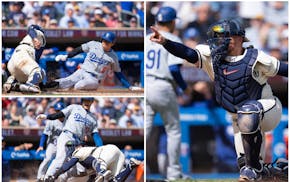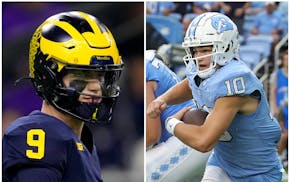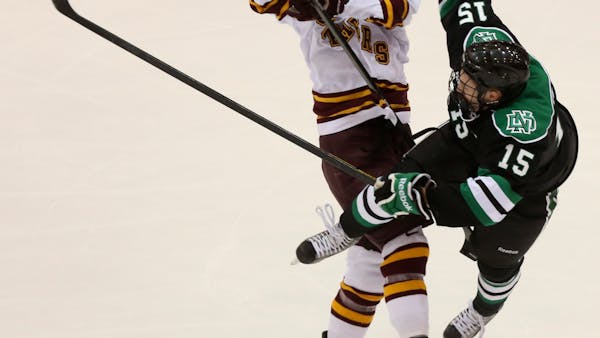PHILADELPHIA – Don Lucia turns 56 in a few months and has coached college hockey for nearly three decades. His résumé includes two national titles, 650 victories and a bunch of All-America players.
The guy is pretty set in his ways.
That doesn't mean ''The Don'' can't be flexible, too, if needed. Doesn't mean he's averse to change or is unwilling to adjust his approach. Look no further than his current team.
The Gophers spent the majority of the season ranked No. 1 nationally and reached the NCAA Frozen Four because of the sum of their parts, not on the strength of a couple of one-and-done NHL hopefuls. A team that relies on its blazing speed also resembles a team built to win at the college level.
The Gophers most certainly possess some high-end talent, but the roster also reflects a deliberate tweak in Lucia's recruiting approach designed to provide stability in response to the gravitational pull of professional hockey.
A team flush with surefire NHL prospects is wonderful. Until they all leave school early.
Lucia made a conscious decision a few years ago to balance his roster with some "program" guys, players who could grow and develop and stick around for three or even four years.
He studied the success that Boston College has enjoyed with veteran rosters. That reinforced Lucia's belief that his own program needed a similar approach in order to withstand early departures to the NHL. It's OK to occasionally recruit players for specific roles.
"You have to have a mix," Lucia said. "We can't build our program if there's constant turnover. You just can't. And we went through that a few years back. We need to have good college players."
This Gophers team fits that mold in terms of its physical stature. Ten players are listed at 5-10 or shorter. The Gophers are small and have remarkable team speed throughout the lineup, but it's not a roster that makes you stop and scream, "Look at all that NHL talent on display!"
The Gophers endured a stretch in the mid-2000s in which a group of star players — Erik Johnson, Phil Kessel and Kyle Okposo, to name a few — turned pro with at least two years of eligibility remaining. Their departures staggered the program and created some instability.
"Go back five years and we got caught," Lucia said. "Ultimately, that was my fault, some of the change occurred."
Lucia emphasizes that he doesn't blame those players who left early. Those were great players. But personnel losses of that kind eventually create challenges.
"I'm not saying those guys weren't invested [in the program]," Lucia said. "How do you fault a guy — whether they're here for one year or two years — if they go to the NHL and make a million dollars? We all wish we had that opportunity. But you can't lose three and four guys every year after year after year. You can't replace that much talent that quickly."
The NHL's salary cap era has forced Lucia to tweak his recruiting approach because, he says, teams prefer to sign players at a younger age. And every coach in every sport — with the exception of Kentucky's John Calipari — swears by the value of experience and veteran rosters.
Does that mean the Gophers won't continue to lose players to the NHL after one or two seasons? Of course not. It won't be surprising if three players on this team — sophomore defensemen Brady Skjei and Mike Reilly and freshman forward Hudson Fasching — give serious consideration to turning pro.
Early departures will happen as long as the Gophers continue to recruit elite talent, which remains the standard and expectation. But Lucia has found a formula that better enables his program to withstand those critical departures.
"I don't know how much we shifted recruiting philosophy; we just had to blend it," he said. "It wasn't like, 'Oh geez, I got really smart.' No, it's like, 'OK, what do we have to do with our program to make sure that kids are invested in Gopher hockey and that there's probably going to be more three- and four-year players.' "
Chip Scoggins chip.scoggins@startribune.com
Scoggins: Why 'championship or bust' fits these Wolves

Scoggins: Anatomy of a game-saving play as Correa throws out Ohtani

Scoggins: McCarthy or Maye? Ex-U coach breaks down Vikings' options
Scoggins: Cory Provus getting ready for 'biggest challenge' of career


